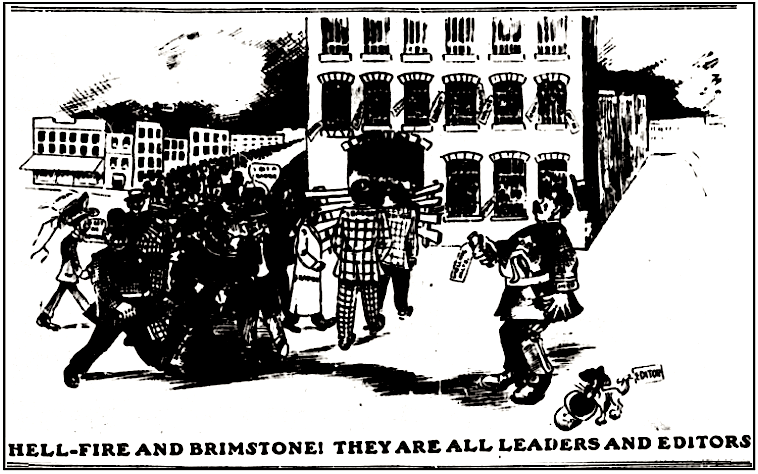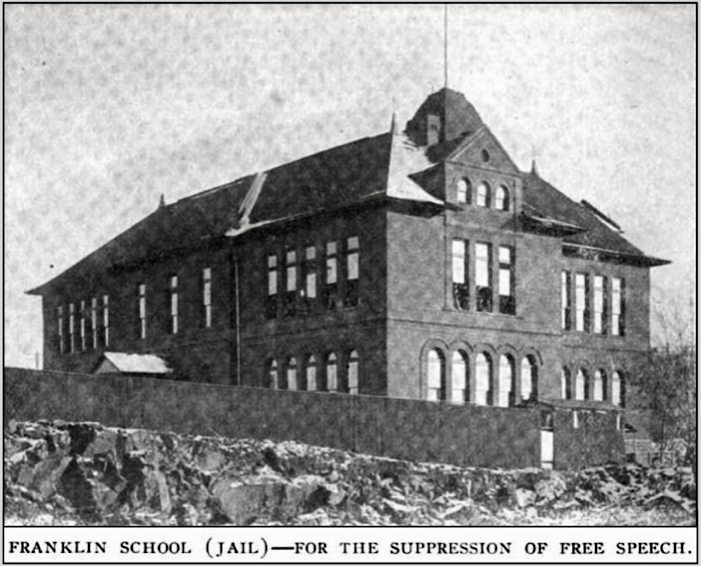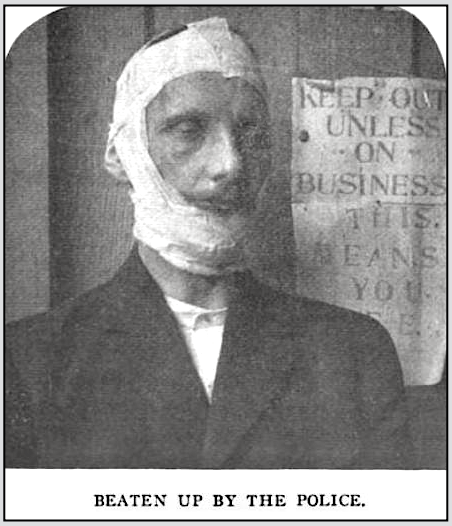 ———-
———-
Hellraisers Journal – Saturday February 26, 1910
Spokane, Washington – The Affidavit of Fellow Worker J. C. Knust
From the Seattle Socialist Workingman’s Paper of February 19, 1910:
KNUST’S AFFIDAVIT
—–State of Washington, County of Spokane, ss.:
J. C. Knust, being first duly sworn on oath, deposes and says:
That I was arrested Nov. 3rd at the corner of Howard and First avenue by Officer Logan and a plain clothes man, while talking to a crowd of about 200 people.
They knocked my hat off, jerked me along, holding me by the shirt collar and choking me. When I protested they hit me over the head.
Officer Logan said: “I suppose you have been in this country about two weeks.” I told him I had fought for my country and thought I had the right to speak on the streets of Spokane.
When we reached the jail they shoved me into the booking window. I was taken into a dark cell 7 feet high by 6½ feet wide and six feet long, with 17 other men.
We were unable to lie down with so many in the cell. Those that did lie down had to do so with their heads to the wall and their feet to the center of the cell and with their feet on top of each other and higher than their heads. The man underneath was naturally restless with the heavy load from the others upon him and was always anxious to get to the top of the pile.
The air in the cell was foul, with no sanitary facilities, no soap, towels, etc.
At 6 in the evening and seven in the morning we were given food, but few of us could eat it. They kept cutting down what little grab we had, until there was hardly anything to speak of.
One day I was taken into Judge Mann’s kangaroo court and after a farce trial was sentenced to thirty days.
I tried to give a full statement of how I was arrested by the Cossacks of Spokane, when Judge Mann stepped in and refused to let me continue.
I then tried to swear out a warrant against Officer Logan for assault and battery, but Mann refused to issue the warrant.
I was placed back in the cell, where we spent an awful night, the groaning and crying of the men being terrible.
Many men fainted and many were taken out unconscious, but the jail or hospital above began to be filled up so fast from those below that the jailer refused to heed our cries.
We were not allowed to see an attorney, friends, relatives, etc.
There were ten cells in the jail and they were all filled like mine inside of four days. Drunks were shown more courtesy and were given more to eat; many were turned out the same night they were arrested.
Friday night they refused anything but bread to those convicted. The members of my cell refused to eat the bread, and that started what was known as the hunger strike. The next morning we were scattered throughout the jail, as they said we were the ones that were starting the strike, but nevertheless the strike had spread all over the jail. Even Lawyer Crane, a non-member of the I. W. W., refused to eat his supper.
There were 36 in the sweat cell which was little larger than the jail cell.
I fasted eight and a half days. During the hunger strike they took about eighty of us into the Franklin school under heavy guard, as if we were desperate criminals.
We were placed in a large room at the school, with no fire, blankets, nor food. I walked the floor all night and nearly froze to death.
Eight armed guards were walking around the school.
The only toilet facilities arranged for us was an old pall placed in the room.
They tried to tantalize us with bread, as in the jail, where they forced it in our cells. We threw it out, telling them we did not want anything less than a square meal.
In the school they were even more determined to break our solidarity, but so far as I know no one accepted the bread. They even took each one of us aside and tried to induce us to go on the rock pile, telling us that we were following false leaders.
We asked for wood in the school, and they told us we could freeze to death.
To let the people know who we were we tore up red tobacco sacks and made I. W. W. signs on the windows.
Finally they took Oscar Anderson, Frank Reed, Frank Dickson and myself, supposed leaders, back to the hot box at the city prison.
Next we were taken to Fort Wright with about seventy others, under heavy guard. They took us out on the car and had about fifty policemen to guard it. The car was so heavily loaded and going so fast that it jumped the track, and as they were unable to get it on the track, they sent for the fort guards and marched us the remainder of the way, which was about half a mile.
We were notified, at the fort that night that the soldiers guarded us with loaded guns and that death would be our fate if we tried to escape.
The steam was very light at the fort and we were getting weaker and weaker and our blood getting thinner each day. Several of us never left our beds until we were taken to the hospital. Our beds were empty frame iron beds with no mattress and no blankets, and a few of the cots were canvas.
The bread was placed before us in big piles, but no one took it and the strike would have continued, but one day the outside committee called it off after seven and one-half days.
I told the doctor that I had been slugged and that the jail was unsanitary which he denied and he left, never returning to treat us at Fort Wright again. Quinine and pills served for every ailment, and occasionally they gave us salts.
The physician said he hoped to God that some of us died, and the jailer also made a like statement, and said it would cost only 49 cents to take us to the crematory, where they would dispose of us.
Many men were slugged after being arrested, and also after they got in jail. One man whose jaw was broken by a policeman’s club is now in the Fort Wright hospital and it will be several months before his recovery. He received no attention from the city physician for five days, and after arriving at the fort the Fort Wright physician demanded his release to the Fort Wright hospital, where he could give him attention.
Because we demanded more bread and heat we were locked up for two nights in cells away from toilet. As we were not allowed outside the jail, it was in a terrible condition the next morning, and would only have been a matter of time before contagious diseases would have broken out.
The bread was cut down three different times from half a loaf, which was nine ounces, to about four ounces of bread morning and evening.
Thanksgiving day was celebrated with recitations, speaking, singing the national songs, and a general good time; in fact, too much energy was lost, as it made us very weak, but created a greater solidarity than had existed before.
Two days later at midnight I was taken out as one of the instigators of the Thanksgiving festivities, with two other so-called leaders, and got another change of hell, being placed in what is called “lousy 13” in the city jail. We were given one 5-cent loaf of bread among seven of us, no blankets, no hammocks, no soap, no towels, no salt.
We were never allowed a change of clothing nor soap for our faces. Words fail to express the filth of the jail and the lousy condition.
We remained in “durance vile” for eight and one-half days, until we completed our term and three days over. They added the three days for court costs.
J. C. KNUST.
Subscribed and sworn to before me this 3rd day of February, 1910.
(Name Omitted.)
Notary Public in and for the state of Washington, residing at Spokane.
[Photographs and emphasis added.]
~~~~~~~~~~~~~~~~~~~~~~
SOURCES
Quote EGF, re Spk FSF, ISR p618, Jan 1910
https://play.google.com/books/reader?id=MVhIAAAAYAAJ&printsec=frontcover&pg=GBS.PA618
The Workingman’s Paper
(Seattle, Washington)
-Feb 19, 1910
https://www.marxists.org/history/usa/pubs/thesocialist-seattle/100219-seattlesocialist-v10w460.pdf
IMAGES
Spk FSF, Leaders n Editors, IW p1, Nov 17, 1909
https://www.marxists.org/history/usa/pubs/industrialworker/iw/v1n35-nov-17-1909-IW.pdf
IWW Spk FSF, Franklin School Jail, ISR p612, Jan 1910
https://play.google.com/books/reader?id=MVhIAAAAYAAJ&printsec=frontcover&pg=GBS.PA612
Spk FSF, FW Beaten by Police, ISR p705, Feb 1910
https://play.google.com/books/reader?id=MVhIAAAAYAAJ&printsec=frontcover&pg=GBS.PA705
See also:
Hellraisers Journal – Friday February 25, 1910
Spokane, Washington – Facts of Free Speech Fight from J. C. Knust for the Socialist Workingman’s Paper
Tag: Spokane Free Speech Fight of 1909-1910
https://weneverforget.org/tag/spokane-free-speech-fight-of-1909-1910/
Tag: J. C. Knust
https://weneverforget.org/tag/j-c-knust/
~~~~~~~~~~~~~~~~~~~~~~~~~~~~~~~~~~~~~~~~~~~~~
There is Power in The Union – Utah Phillips
Lyrics by Joe Hill



